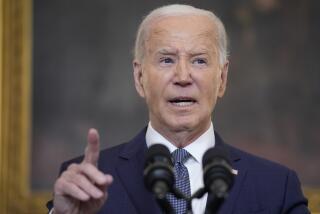U.S. Renews Efforts for Allied Action on Bosnia : Diplomacy: Consensus on military intervention still lacking. Christopher to lobby Europeans once again.
WASHINGTON — In a sign that U.S. efforts to work out a joint military intervention in Bosnia-Herzegovina may have stalled, President Clinton instructed Secretary of State Warren Christopher on Saturday to begin a new round of talks with European leaders on possible approaches for stopping the Bosnian civil war.
After the President met for two hours Saturday morning with Christopher and his other top foreign policy advisers, White House Communications Director George Stephanopoulos said that the United States and its allies have generally reached “a consensus . . . on the need for stronger actions” to stop the Bosnian Serbs.
But the White House spokesman made no claim that European officials have agreed on air strikes or any other specific military action, and the only decision announced Saturday was for Christopher to start a new round of talks over the telephone with the Europeans.
That appeared to put the Administration back in roughly the same position it was in a week ago, still trying to find a plan for Bosnia that is acceptable to European governments. The secretary of state had already spent most of the past week journeying through the capitals of Europe trying, apparently without success, to overcome allied objections to military intervention in Bosnia.
As recently as Friday, Clinton had sounded an optimistic note, telling reporters, “I think there’s a lot more agreement than you think, and I think in the next few days we’ll see a common approach emerging.”
But after Clinton’s meeting Saturday with Christopher, Defense Secretary Les Aspin, Joint Chiefs of Staff Chairman Colin L. Powell and other senior Administration officials, White House officials tried to dampen expectations of any immediate action by the United States and its allies.
“I don’t think there’s any hard timetable,” Stephanopoulos said. “The President has asked Secretary Christopher to call his counterparts. . . . There’s a consensus now on the need to take stronger actions. On the exact next steps, we’re still working on that.”
Among the military options the United States has been urging upon European nations are allied air strikes against artillery emplacements of the rebel Bosnian Serbs and a modification of an international arms embargo to permit weapons shipments to Bosnia’s beleaguered Muslims.
Stephanopoulos also told reporters that the Administration wants time to see whether Serbian President Slobodan Milosevic will live up to his announced plan to cut fuel and other vital supplies to the Bosnian Serbs. So far, the Serbs have overrun more than 70% of Bosnia-Herzegovina and conducted a ruthless campaign to “cleanse” the region of its Slavic Muslim inhabitants. The drive has displaced an estimated 2 million people and left at least 135,000 people dead and missing.
In Moscow, Russian President Boris N. Yeltsin made it clear that he opposes unilateral U.S. military action, even in the likely event that Bosnian Serb voters reject the so-called Vance-Owen peace plan for Bosnia in a referendum scheduled next weekend. The plan, developed by Cyrus R. Vance of the United Nations and Lord Owen of the European Community, divides Bosnia into 10 autonomous provinces to try to keep apart its warring religious factions--Serbs, Muslims and Croats, all of them ethnic Slavs.
Yeltsin, holding a joint news conference with visiting Canadian Prime Minister Brian Mulroney, said Saturday, “I stress it again--any spontaneous measures (in Bosnia) bypassing the (U.N.) Security Council are ruled out.”
Any Western move against the Serbs in the former Yugoslav federation is a highly charged political issue in Russia, holding definite risks for Yeltsin. His nationalist foes in the Congress of People’s Deputies are ardent supporters of Serbia.
The United States, Britain and France still disagree over means to help stop the fighting in Bosnia. Still, in recent days, U.S., British and French officials have said that beneath their discord is a new consensus on some fundamental issues:
* Military action of some kind is increasingly likely now that negotiations toward a peace plan have apparently failed--Bosnia’s Muslims and Croats have accepted the Vance-Owen plan, but the Serbs have repeatedly rejected it.
* The objectives of any action should be to halt attacks on civilian areas.
* Agreement is growing that air strikes are a way to achieve the goals.
“It is becoming clear that, sooner or later, we will all be in Bosnia together--all of us,” a French official said. “But no one is ready yet. The European governments aren’t ready; the American public isn’t ready. So we need more time to decide what our precise objectives and methods should be.”
Over the past few weeks, European leaders had repeatedly complained that Western military action, such as air strikes, could jeopardize the lives of U.N. peacekeeping forces in Bosnia on humanitarian missions by provoking retaliation from the Bosnian Serbs. The peacekeepers include French, British, Russian, Ukrainian, Spanish and Canadian soldiers but no Americans.
On Saturday, in an effort to overcome European objections to Western military action, Bosnian Foreign Minister Haris Silajdzic took the drastic step of urging the United Nations to pull its peacekeeping forces out of the country.
U.S. officials seemed to be putting a greater emphasis Saturday than they have before on hopes that Milosevic will effectively deprive the Bosnian Serbs of supplies needed to continue fighting.
Sen. Sam Nunn (D-Ga.), chairman of the Senate Armed Services Committee, said on CNN’s “Newsmaker Saturday” that if Milosevic kept his promise to cut off arms supplies to the Serbs, “it would send a shock wave to (them) that they are beginning to be isolated.”
And Sen. Richard G. Lugar (R-Ind.) told CNN that Milosevic might have moved to cut off the Bosnian Serbs out of the realization that Clinton is probably considering air strikes that would affect the Serbian infrastructure and not just Serbian targets in Bosnia.
Including Serbia in the air strikes “would be my advice,” Lugar said. “I don’t know whether the President would adopt it or not. Clearly strikes beyond Bosnia would have to be, I believe, a very important part of the plan.”
Over the past week, the question of whether to support the use of force in Bosnia has divided members of Congress.
Times staff writer John-Thor Dahlburg, in Moscow, contributed to this report.
* CEASE-FIRE AGREEMENT: The Bosnian government and rebel Serbs agree to truce. A6
More to Read
Get the L.A. Times Politics newsletter
Deeply reported insights into legislation, politics and policy from Sacramento, Washington and beyond. In your inbox three times per week.
You may occasionally receive promotional content from the Los Angeles Times.











